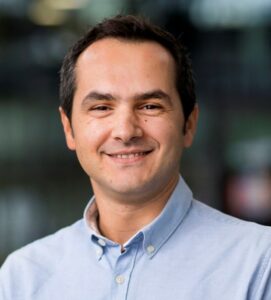Vlado Menkovski
Eindhoven University of Technology
Deep Learning

In this series of lectures, we will explore the fundamental concepts of Deep Learning that have revolutionized various fields such as speech recognition, computer vision, and conversational agents. At the heart of Deep Learning lies the ability to learn representations of complex data with high dimensions. Analyzing, predicting, or generating such data poses significant challenges. For instance, consider the task of recognizing elephants and giraffes in an image. Describing an elephant solely based on pixel values is difficult. There is a very large number of pixel value combinations that would look like an elephant. Therefore describing an elephant using pixel values would en an infeasible task. Even taking a data-driven approach by training Machine Learning algorithms to differentiate the animals based on pixel colors proves challenging in general. Deep Learning provides a powerful toolkit for learning efficient representations of high-dimensional data, empowering us to build solutions like image recognition. Moreover, Deep Learning has facilitated the development of a vast array of solutions including Large Language Models capable of understanding and generating natural language and Stable Diffusion models capable of generating realistic high-resolution images from textual descriptions.
To gain a deeper understanding of this technology, we will delve into the artificial neural network (ANN) model, which serves as the foundation of Deep Learning. We will explore the training process for various ANN models, the challenges involved in developing large-scale models, techniques for addressing these challenges by incorporating symmetries into the models, and training large models on extensive datasets using the transformer architecture. Additionally, we will present various examples showcasing the application of Deep Learning in different domains.
Vlado Menkovski an Assistant Professor at the Data and AI cluster at Eindhoven University of Technology (TU/e). His research interests are centered at the intersection of Machine Learning and Natural Sciences. The primary focus of his work has been models for high-dimensional data and simulation utilizing deep generative models. This work falls within the domain of Scientific Machine Learning, with specific contributions in the areas of Deep Geometric Learning and Generative AI on the Machine Learning side, as well as Nuclear Fusion, Material Science, and Biomedical Engineering with contributions such as surrogate models, in-silico simulation, and predictive analytics. Dr. Menkovski teaches a Deep Learning course as part of the masters in Data Science and AI at TU/e and has (co-)supervised 3 PhD and 50 MSc projects currently supervising 10 MSc and 7 Ph.D. students on various topics Deep Learning for Scientific Discovery and Engineering.